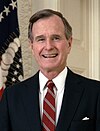
The 1992 United States presidential election was the 52nd quadrennial presidential election, held on Tuesday, November 3, 1992. Democratic Governor Bill Clinton of Arkansas defeated incumbent Republican President George H. W. Bush and independent businessman Ross Perot of Texas. The election marked the end of a period of Republican dominance in American presidential politics that began in 1968, and also marked the end of 12 years of Republican rule of the White House, as well as the end of the Greatest Generation's 32-year American rule and the beginning of the baby boomers' 28-year dominance until 2020. It was the last time the incumbent president failed to win a second term until Donald Trump in 2020.

The 1988 United States presidential election was the 51st quadrennial presidential election held on Tuesday, November 8, 1988. Incumbent Republican Vice President George H. W. Bush defeated the Democratic Massachusetts Governor Michael Dukakis.

Robert Joseph Dole was an American politician and attorney who represented Kansas in the United States Senate from 1969 to 1996. He was the Republican Leader of the Senate during the final 11 years of his tenure, including three non-consecutive years as Senate Majority Leader. Prior to his 27 years in the Senate, he served in the United States House of Representatives from 1961 to 1969. Dole was also the Republican presidential nominee in the 1996 election and the vice presidential nominee in the 1976 election.

The New Hampshire presidential primary is the first in a series of nationwide party primary elections and the second party contest, the first being the Iowa caucuses, held in the United States every four years as part of the process of choosing the delegates to the Democratic and Republican national conventions which choose the party nominees for the presidential elections to be held in November. Although only a few delegates are chosen in the New Hampshire primary, its real importance comes from the massive media coverage it receives, along with the first caucus in Iowa.
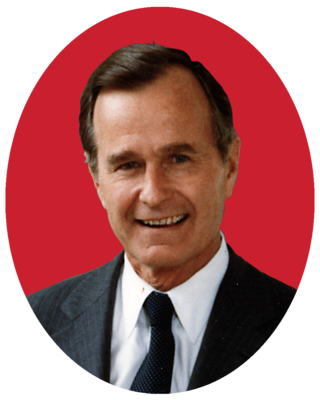
The 1988 Republican National Convention was held in the Louisiana Superdome in New Orleans, Louisiana, from August 15 to August 18, 1988. It was the second time that a major party held its convention in one of the five states known as the Deep South, coming on the heels of the 1988 Democratic National Convention, which was held in Atlanta, Georgia.

The 1980 Republican National Convention convened at Joe Louis Arena in Detroit, Michigan, from July 14 to July 17, 1980. The Republican National Convention nominated retired Hollywood actor and former Governor Ronald Reagan of California for president and former Representative George H. W. Bush of Texas for vice president.
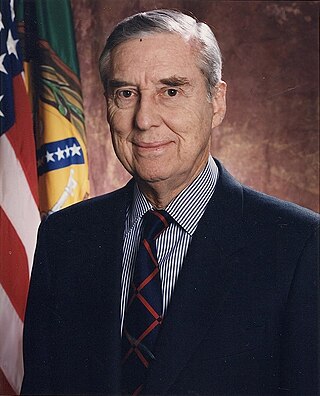
"Senator, you're no Jack Kennedy" was a remark made during the 1988 United States vice presidential debate by Democratic nominee Senator Lloyd Bentsen to Republican nominee Senator Dan Quayle in response to Quayle's mentioning the name of John F. Kennedy, the Democratic 35th president of the United States, whom Bentsen knew from their time as congressmen from the 80th to 82nd Congresses. Since then, the words "You're no Jack Kennedy," or some variation on the remark, have become a part of the political lexicon as a way to deflate politicians or other individuals perceived as thinking too highly of themselves. Michael Dukakis and Bentsen later went on to lose the 1988 United States presidential election to George H. W. Bush and Quayle, who thus succeeded Bush as vice president of the United States.

From February 8 to June 14, 1988, voters of the Democratic Party chose its nominee for president in the 1988 United States presidential election. Massachusetts governor Michael Dukakis was selected as the nominee through a series of primary elections and caucuses culminating in the 1988 Democratic National Convention held from July 18 to July 21, 1988, in Atlanta, Georgia.

From January 29 to June 4, 1996, voters of the Republican Party chose its nominee for president in the 1996 United States presidential election. Senator Bob Dole of Kansas, the former Senate majority leader, was selected as the nominee through a series of primary elections and caucuses culminating in the 1996 Republican National Convention held from August 12 to 15, 1996, in San Diego, California. Dole resigned from the Senate in June 1996 once he became the presumptive nominee to concentrate on his presidential campaign. He chose Jack Kemp as his running mate.
Bill Clinton served as the 42nd president of the United States (1993–2001) and as the 40th and 42nd governor of Arkansas. A member of the Democratic Party, Clinton first ran for a public office in 1974, competing in the congressional election for Arkansas's 3rd congressional district. After narrowly losing to incumbent representative John Paul Hammerschmidt, he ran for the office of Arkansas Attorney General in 1976. He won the Democratic primary comfortably, receiving over 55% of the popular vote. Witnessing his strong support during the primaries, Republicans did not nominate a candidate to run against him. Clinton won the general election unopposed. His experience as the attorney general was considered a natural "stepping-stone" to the governorship.
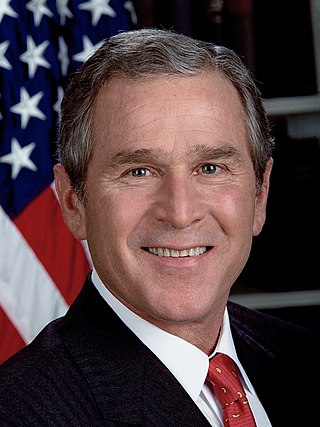
From January 24 to June 6, 2000, voters of the Republican Party chose its nominee for president in the 2000 United States presidential election. Texas Governor George W. Bush was selected as the nominee through a series of primary elections and caucuses culminating in the 2000 Republican National Convention held from July 31 to August 3, 2000, in Philadelphia, Pennsylvania.

The 1980 presidential campaign of Ronald Reagan resulted in the election of Ronald Reagan and his running mate George H. W. Bush as president and vice president of the United States, defeating incumbent Democratic President Jimmy Carter and Vice President Walter Mondale.

The 1988 United States elections were held on November 8 and elected the President of the United States and members of the 101st United States Congress. Republican Vice President George H. W. Bush defeated Democratic Governor of Massachusetts Michael Dukakis. Despite Dukakis' defeat, the Democratic Party built on their majorities in Congress.
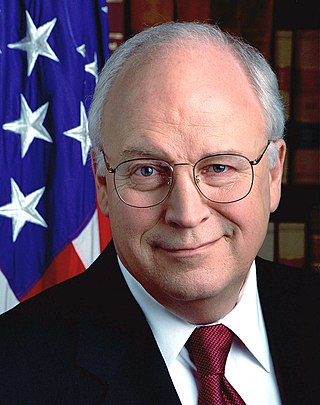
This article lists those who were potential candidates for the Republican nomination for Vice President of the United States in the 2000 election. On March 7, 2000, Texas Governor George W. Bush won the 2000 Republican nomination for President of the United States, and became the presumptive nominee. On July 25, 2000, former Secretary of Defense Richard B. Cheney was chosen as his running mate.

This article lists those who were potential candidates for the Republican nomination for Vice President of the United States in the 1988 election. Incumbent Vice President George H. W. Bush won the 1988 Republican nomination for President of the United States, and chose Indiana Senator Dan Quayle as his running mate. The selection of Quayle surprised many of Bush's closest advisers, who had expected Bush to pick a more well-known running mate. However, Bush adviser Roger Ailes helped convince Bush that Quayle would be able to effectively attack the Democratic presidential nominee, Michael Dukakis. Bush also liked Quayle's youth and felt that Quayle would make for a loyal vice president. The Bush–Quayle ticket ultimately defeated the Dukakis–Bentsen ticket in the 1988 election.

This article lists those who were potential candidates for the Republican nomination for Vice President of the United States in the 1980 election. Former California Governor Ronald Reagan won the 1980 Republican nomination for President of the United States, and chose former CIA Director George H. W. Bush as his running mate.

The 1988 presidential campaign of George H. W. Bush, the 43rd vice president of the United States under President Ronald Reagan, began when he announced he was running for the Republican Party's nomination in the 1988 U.S. presidential election on October 13, 1987. Bush won the 1988 election against Democratic nominee Michael Dukakis on November 8, 1988. He was subsequently inaugurated as president on January 20, 1989.
Since 1980, the Republican Party of the United States has held debates between candidates for the Republican nomination in presidential elections during the primary election season. Unlike debates between party-nominated candidates, which have been organized by the bi-partisan Commission on Presidential Debates since 1988, debates between candidates for party nomination are organized by mass media outlets.

In New Hampshire, United States, the communities of Dixville Notch, Hart's Location, and Millsfield all vote at the midnight beginning election day, known as the New Hampshire midnight votes, on the day of the state's political party primaries and general elections, following a tradition that started to accommodate railroad workers who had to be at work before normal voting hours. The voting tradition has been followed in Dixville Notch since the 1960 presidential election, in Hart's Location from 1948 to 1964 and from 1996 to 2020, and in Millsfield in 2016 and 2020.

































